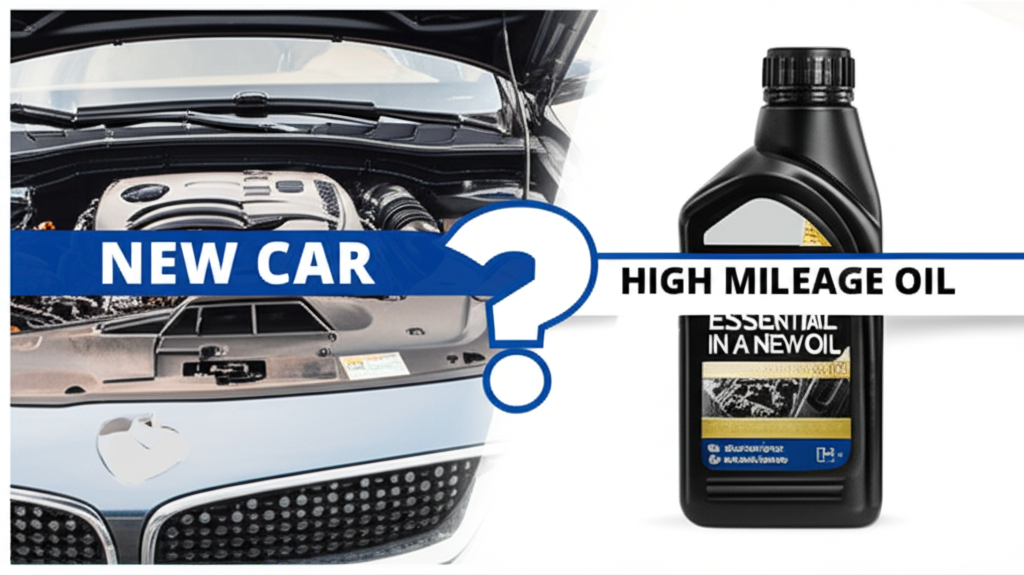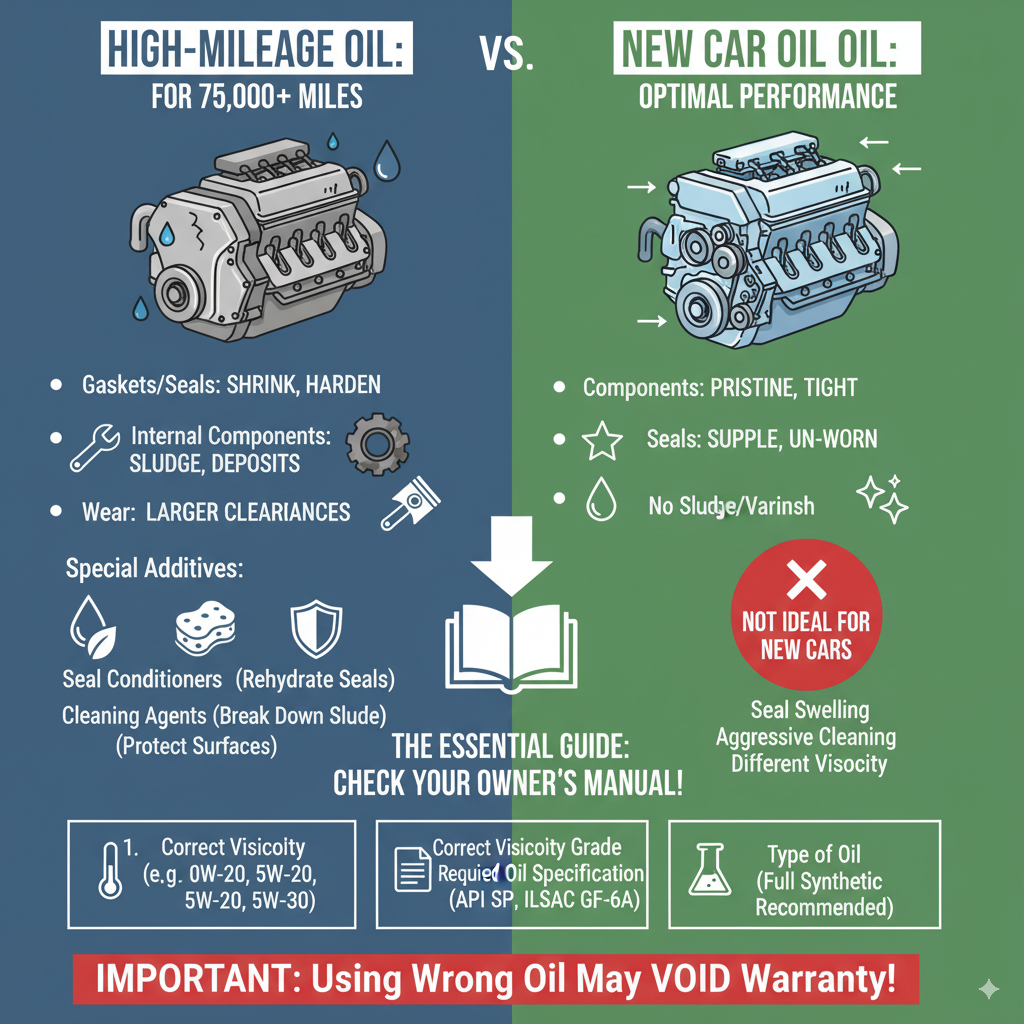Quick Summary:
Generally, it’s not recommended to use high mileage oil in a brand new car. New cars have specific oil requirements designed for their clean, tight engine components. High mileage oils contain additives that can be too aggressive for these new parts, potentially causing issues. Always stick to the oil type recommended in your car’s owner’s manual.
Welcome, friends! Ever find yourself staring at the shelves of motor oil, completely puzzled by all the different types? You see “conventional,” “synthetic,” “full synthetic,” and then, “high mileage.” It’s enough to make anyone’s head spin, especially when you’re just trying to do right by your trusty new car. You might wonder, “Can you use high mileage oil in a new car?” It seems like a good idea to protect a new investment, right? But is it really the best choice? Don’t worry, we’ll break it down in a way that makes perfect sense, so you can feel confident about what goes into your engine. We’ll explore what high mileage oil is, why manufacturers recommend specific oils for new cars, and the potential outcomes of using the wrong kind. Let’s get your car the care it deserves!
Understanding High Mileage Oil
Before we dive into whether you can use high mileage oil in a new car, let’s get a clear picture of what “high mileage” oil actually is. Think of it as a specialized blend designed for engines that have seen better days. As engines age, they can develop small leaks, wear down seals, and accumulate sludge or deposits. High mileage oils are formulated with specific additives to address these very issues.
What Makes High Mileage Oil Different?

The main difference lies in the additives. These oils typically contain:
- Seal Conditioners: These help to swell and rehydrate old, hardened rubber seals and gaskets. Over time, these seals can shrink and crack, leading to oil leaks. The conditioners in high mileage oil aim to prevent or slow down this process.
- Detergents and Dispersants: While all oils have these, high mileage oils often have a bit more. They help break down and suspend sludge and varnish that can build up in an older engine, keeping oil passages clearer.
- Anti-wear Additives: These provide an extra layer of protection for engine parts that have experienced some wear and tear.
These components are formulated to be beneficial for engines with many miles on them, often those over 75,000 miles, or engines that have experienced inconsistent maintenance. They are basically like a specialized supplement for an older, more seasoned engine, helping to keep it running smoothly for longer.
The Case for Using Manufacturer-Recommended Oil in New Cars
When you drive your car off the lot, its engine is pristine. Every component is new, precisely fitted, and free from wear, sludge, or leaks. This is why manufacturers are very specific about the type of oil they recommend. Your car’s owner’s manual is the ultimate guide here. It’s not just a suggestion; it’s based on extensive engineering and testing.
Why Your Owner’s Manual Matters Most
Your car’s manufacturer has designed and built its engine. They know exactly what it needs to perform optimally and last as long as possible. Here’s why sticking to their recommendation is crucial for a new vehicle:
- Precision Engineering: New engines have very tight tolerances between moving parts. They require an oil that provides the right viscosity and film strength to lubricate these surfaces without causing friction or wear.
- Cleanliness: New engines are designed to be clean. They don’t have the sludge or deposits that high mileage oils are meant to combat. Using aggressive cleaning additives in a clean engine might not be necessary and could potentially disrupt the factory settings.
- Warranty Protection: Most new car warranties stipulate that you must follow the manufacturer’s maintenance schedule and use approved fluids. Deviating from this could void your warranty, which would be a costly mistake. For example, the Federal Trade Commission (FTC) explains that manufacturers cannot void your warranty simply because you use a different brand of oil, but they can require that the substitute product meets their specifications. Using the wrong type of oil would likely fall outside those specifications.
- Fuel Efficiency and Performance: The specific viscosity and formulation of the recommended oil are optimized for your car’s particular engine to achieve the best fuel economy and performance ratings.
Think of it like this: a newborn baby needs specialized, gentle formula. They don’t need the nutritional supplements designed for an aging adult. Similarly, a new car engine needs the “formula” it was designed for.

Recap: Can You Use High Mileage Oil in a New Car? The Direct Answer
So, to answer our main question directly: No, it is generally not recommended to use high mileage oil in a brand new car. Your new car has an engine that is clean, with perfectly functioning seals and minimal wear. High mileage oils are designed with specific additives to address the issues found in older, worn engines, such as seal leaks and sludge buildup. Introducing these additives into a new engine might be unnecessary and could potentially interfere with its pristine condition.
The oils recommended by your car manufacturer are specifically formulated for the precise tolerances and materials of your new engine. These oils ensure optimal lubrication, protection, and performance without introducing components that a new engine doesn’t need. Always consult your owner’s manual for the correct oil type, viscosity grade (like 5W-30 or 0W-20), and API service classification.
Understanding Oil Viscosity and Specifications
When you look at a bottle of motor oil, you’ll see numbers and letters that might seem like a secret code. These are crucial for understanding what kind of oil your car needs. The two main things to pay attention to are viscosity and the API service classification.
Viscosity: The “Thickness” of Oil
Viscosity is simply a measure of how thick or fluid an oil is. It’s graded by the Society of Automotive Engineers (SAE). You’ll see numbers like 5W-30 or 0W-20. Let’s break that down:
- The “W” Number (e.g., 5W, 0W): This refers to the oil’s performance in cold temperatures. The “W” stands for “Winter.” A lower number (like 0W) means the oil is thinner and flows more easily when it’s cold, allowing for quicker lubrication of engine parts during startup.
- The Second Number (e.g., 30, 20): This refers to the oil’s viscosity at normal engine operating temperatures (around 212°F or 100°C). A higher number means the oil is thicker at operating temperature, providing a stronger protective film.
Manufacturers specify a viscosity grade that is optimal for their engines across a typical range of operating temperatures. Using an oil that is too thick or too thin can impact wear, fuel economy, and performance. For example, the American Petroleum Institute (API) provides standards for engine oil performance.
API Service Classification and Standards
The API service classification tells you about the oil’s performance characteristics and the types of engines it’s suitable for. For gasoline engines, you’ll see classifications like “SN,” “SP,” etc. Newer classifications replace older ones, offering improved performance, fuel economy, and protection against modern engine demands like direct injection and turbochargers.
Your owner’s manual will specify both the SAE viscosity grade (e.g., 5W-30) and the API service category (e.g., API SP) that your new car requires. Using an oil that meets these exact specifications is key.
When Could High Mileage Oil Be Considered (Even If Not For Brand New)?
While we’ve emphasized that high mileage oil isn’t for brand new cars, there are situations where it becomes a legitimate consideration. This is usually when an engine starts showing signs of age, typically after 75,000 miles or more, or if maintenance has been less than ideal.
Signs Your Engine Might Benefit from High Mileage Oil
If your car is no longer considered “new” and begins to exhibit some of the following symptoms, then high mileage oil might be something to explore:
- Minor Oil Leaks: You notice oil spots under your car, or the oil level consistently drops between changes.
- Increased Oil Consumption: Your car seems to be burning more oil than it used to.
- Engine Noise: You hear slight tapping or knocking noises that might indicate increased wear or sludgy passages.
- Older Engine Still in Service: Even if well-maintained, components can wear over time. An engine with a significant number of miles is a prime candidate.
A good rule of thumb is to consult your owner’s manual. If it suggests that for engines with higher mileage, an alternative oil formulation might be available, or if you’re experiencing symptoms and your car is significantly past its “new” phase, high mileage oil could be a beneficial switch. It’s essentially a proactive measure to help maintain an older engine.
Potential Risks of Using High Mileage Oil in a New Car
You might be thinking, “What’s the worst that could happen?” While modern engines are robust, introducing the wrong kind of lubricant can lead to unintended consequences. It’s important to understand these potential risks before considering anything other than manufacturer-recommended oil for your new vehicle.
The Downsides to Consider
- Damage to Seals and Gaskets: While seal conditioners are meant to help old seals, in a new engine, they could potentially cause newer, still-flexible seals and gaskets to swell too much or prematurely degrade. This could lead to what was a non-existent problem becoming an actual oil leak.
- Over-Cleaning and Deposit Issues: Newer engines have very smooth surfaces and tight tolerances. The stronger detergent packages in high mileage oils, while great for breaking down old sludge, could potentially dislodge microscopic particles or deposits that are simply not present in a new engine, potentially leading to blockages in oil passages or filters.
- Reduced Efficiency: The specific formulation of high mileage oil might not provide the optimal viscosity or friction characteristics for your new engine, potentially leading to slightly worse fuel economy or performance compared to the manufacturer’s recommended oil.
- Voiding Your Warranty: As mentioned earlier, if the oil you use does not meet the specifications outlined in your owner’s manual, and it causes an engine issue, your manufacturer could deny a warranty claim. This is a significant financial risk.
- Unforeseen Long-Term Effects: While not always immediately apparent, using an oil not designed for a new engine could have subtle, long-term effects on wear patterns that might not show up until much later in the vehicle’s life.
These are potential risks, and your new car might tolerate the wrong oil without immediate, catastrophic failure. However, why take the chance when the correct oil is readily available and specifically designed for your engine’s current state?
How to Find the Right Oil for Your New Car
Navigating the world of motor oil doesn’t have to be daunting. Finding the correct oil for your new car is straightforward if you know where to look and what information to gather. The golden rule here is always to prioritize what your car’s manufacturer recommends.
Step-by-Step Guide
- Consult Your Owner’s Manual: This is your most important resource. It will clearly state the required SAE viscosity grade (e.g., 0W-20, 5W-30) and the API service category (e.g., API SP). You can usually find this section under “Maintenance,” “Specifications,” or “Fluids.”
- Identify the Viscosity Grade: Look for the sequence of numbers and the “W” (e.g., 5W-30). This tells you how thick the oil should be when cold and when hot.
- Note the API Service Category: This is the performance standard. For newer cars, you’ll typically see the latest standards like API SP. Avoid oils with older or lower classifications unless your manual specifically allows for them.
- Check for Manufacturer Approvals: Some manufacturers have their own in-house specifications or approvals (e.g., GM dexos®, Ford WSS-M2C946-B1). If your manual lists these, make sure the oil you choose also meets them.
- Choose a Reputable Brand: Once you know the specifications, select a quality motor oil from a trusted brand. You don’t necessarily need the most expensive option, but avoid cheapest generic brands if you’re unsure of their quality control.
- Synthetic vs. Conventional: Many new cars, especially those with turbocharged or high-performance engines, require synthetic oil for better protection and longevity. Your manual will specify this. Synthetic oils generally offer superior performance across a wider temperature range and resist breakdown better than conventional oils.
Example: What You Might Find
Let’s say your owner’s manual for a new sedan reads:
| Specification | Requirement |
|---|---|
| SAE Viscosity Grade | 0W-20 |
| API Service Category | API SP (or newer) |
| Manufacturer Approval (Example) | GM dexos1™ Gen 3 |
When you go to buy oil, you’d look for a bottle that clearly states “0W-20,” has “API SP” (or a newer symbol) on the front, and ideally lists the GM dexos1™ Gen 3 approval. It might also specify “Full Synthetic” if that’s what your car requires.
If your car is a hybrid, electric, or has a specific powertrain, always double-check. For instance, the U.S. Department of Energy discusses how advanced engine oils can contribute to fuel efficiency, highlighting the importance of using the correct, modern formulations.
Common Misconceptions About High Mileage Oil
There are a lot of ideas floating around about car maintenance, and motor oil is no exception. Some of these “tips” are handed down through generations, but they might not hold true for modern vehicles or modern oil technology. Let’s clear up a few common misconceptions about high mileage oil.
Myth vs. Fact
- Myth: High mileage oil will “fix” a new car if it starts to develop problems early.
Fact: If a new car develops issues like leaks or excessive oil consumption very early on, it’s usually a sign of a manufacturing defect or a component failure, not just normal wear. Addressing these issues with high mileage oil might mask the problem or, worse, exacerbate it. It’s best to have it diagnosed and repaired under warranty by a qualified mechanic. - Myth: Using high mileage oil will make my new car’s engine last longer.
Fact: Forcing an older engine formula onto a new, clean engine is unlikely to extend its life and could potentially shorten it by causing unintended changes to seals or introducing unnecessary additives. Proper maintenance with the correct oil is what ensures longevity. - Myth: All “additives” are good for your engine, so those in high mileage oil must be good for any engine.
Fact: Additives are specialized. The ones in high mileage oil are designed to combat the effects of aging and wear. While beneficial for older engines, they can be too aggressive or unnecessary for the perfectly functioning, clean components of a new engine. - Myth: If my car is only a few years old, it’s still new enough not to use high mileage oil.
Fact: “New” is relative. The mileage and age of the vehicle, along with driving conditions and maintenance history, are more critical than just the calendar year. An engine with 100,000 miles driven in harsh city stop-and-go traffic might benefit from high mileage oil sooner than an engine with 50,000 miles primarily driven on highways. The key indicator is engine condition, not just age.
It’s always best to rely on factual information and the manufacturer’s recommendations rather than hearsay when it comes to your vehicle’s health.
What Happens During an Oil Change
An oil change is one of the most basic yet crucial maintenance tasks for any vehicle. It’s designed to keep your engine running smoothly and prevent damage. Understanding what happens during this process can help you appreciate why using the correct oil is so important.
The Oil Change Process
Here’s a simplified look at what typically occurs during a standard oil change:
- Warm Up the Engine: The mechanic or DIYer will run the engine for a few minutes to warm the oil. Warm oil flows more easily, allowing sludge and contaminants to drain out
Recent Posts
Cold-Weather Driving Essentials: Top Gloves for Safe Winter Travel
Keep your hands warm and your steering wheel secure this winter with our top glove picks. Discover the best options for safe and comfortable cold-weather driving!
Tesla Roof Rack Storage: Ultimate Guide to Secure and Versatile Cargo Solutions
Tesla roof rack storage offers extra space to carry luggage and gear securely on your Model Y. These racks fit various needs, from bikes to kayaks, making travel easier. ...


